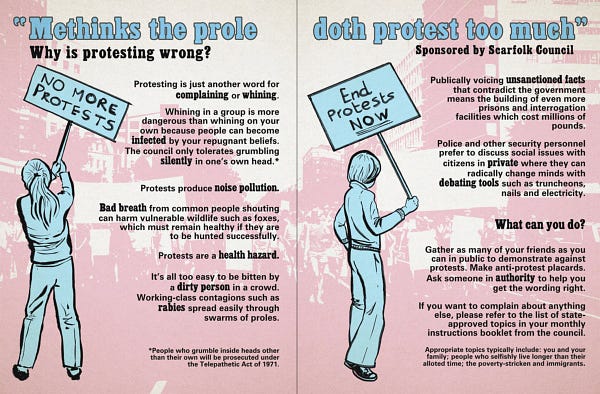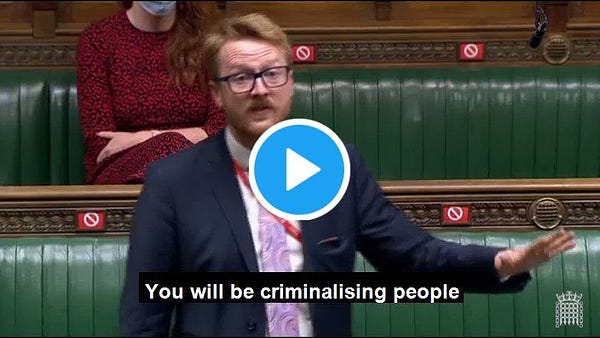Mr Potatohead? Yes! The Police & Crime Bill? No. Where are the British media's 'free speech' defenders now?
With one notable exception, newspaper columnists are ignoring the government's creeping authoritarianism.
Just as many baby boomers suffer from a brain disease that makes them fervently believe they fought in the Second World War — despite the impossible chronology — there is a surfeit of British columnists whose nearest experience of conflict is clashing over some vol au vents at a book launch but are somehow convinced that they are as brave as any war reporter.
I raise this terrifying condition as writers across the British media spectrum — from soft-bellied centrists to rabid hard-righters — turn their attention to Priti Patel’s authoritarian Police, Crime, Sentencing and Courts Bill, legislation expressly designed to make protest almost impossible and to target minorities, particularly the Gypsy, Romany and Traveller community (just as the Tories promised in their manifesto).
If you want to see how the papers wrote about the bill’s most awful provisions before last weekend’s events on Clapham Common, stop here and read the previous newsletter edition on that.

While the right rave about Labour’s opposition to the bill — offered up late and in the lacklustre fashion we have come to expect from Sir Keir Starmer, a flapping femidom fashioned into a crude approximation of a human — saying it is proof that the party is soft of crime, ‘liberal’ columnists and commentators are just getting round to decrying the moves.
For Politics.co.uk, where bloodness, wonkish takes crawl to die, Ian Dunt writes:
The truly frightening thing was that they didn’t even argue for it. Over two days of debate and dozens of speeches, not one government minister actually defended the anti-protest powers in the new policy bill. Only one MP did.
These are the most draconian restrictions we have seen on protests for decades, but those defending them on the government benches would not even mention them. They simply pretended they did not exist. And then they passed them for second reading, by 359 votes to 263.
The bill gives police the power to impose severe restrictions on protests if they suspect they “may result in serious disruption to the activities of an organisation” or could cause “serious unease, alarm or distress” to a passer-by. This applies to every single protest outside parliament and indeed to any protest anywhere. There has never been a protest which you could prove would not alarm someone. They make noise. That is what they do. The bill puts the power as to whether a protest can be held entirely in the hands of the police.
And yet even this benchmark was considered too high. So the bill also gave the home secretary the power to change the legal meaning of the term “serious disruption” by statutory instrument – effectively sidestepping parliament. In future, if Priti Patel or one of her successors decides that a protest was legal but they still wanted rid of it, they could simply unilaterally change the law.
He’s right, but his semi-righteous anger… well, more like irritation really, ignores that he and others close to the ‘People’s’ Vote campaign spent so long during the post-Brexit phoney war on a safari to find the ‘good Tories’, even as every candidate they discovered voted with the government and turned out to be every bit as venal as their colleagues. The continuity wing of Remain even lashed their hopes to the mast of the bad ship Change UK — The Independent Group at one point, a party so ludicrous and contemptible that it only makes sense if you think of it as an act of self-debasing performance art.


Just as American political journalists have spent years trying to persuade themselves that the multi-millionaire Mitt Romney is a patriotic man of the people, simply because like them he doesn’t really like Donald Trump, liberal British hacks have had their wallets inspected time and time again by ‘good’ Tories. It’s not that the Tory MPs ‘failed’ to defend the right to protest or true free speech, beyond offensive shit that their favourite newspapers like last night. They actively wanted the bill to pass.


Over at The Telegraph, Fleet Street’s home for the bilious, the belligerent, and the bewildered, Michael Deacon uses his sketch not to focus on the Policing Bill or even the response to the government’s defence and foreign policy review (best summed up as Boris Johnson’s Big Book of Bombs) but to go on about Jeremy Corbyn once again. He writes:
So cataclysmically unpopular was Mr Corbyn that, almost a year after succeeding him, Sir Keir is still desperately trying to mop up the damage. With an almost heartbreaking air of pathos, he jumps at every possible opportunity to stress just how chest-thumpingly patriotic, how proudly British, how utterly un-Corbyn-like he is.
Beyond the flag-shagging, Primark-brand patriotism parroted by Starmer, his actual problem will be that Jeremy Corbyn was very popular with voters under 45 and that his replacement’s policy of shoving the former leader into a cupboard and hoping everyone forgets about him is destined to fail. But leave it to The Telegraph to offer a version of history so partial and distorted that it could be scrawled in full on a napkin from a private member’s club.
Over on The Telegraph comment desk, Charlotte Lytton files what must be the paper’s 500th column in recent months that manages to go on about Churchill. She writes:
On Monday, a week after having invoked the wartime PM on his storm-out from Good Morning Britain (over Meghan Markle...) Piers Morgan became embroiled in yet another row when twin singing duo Jedward, 29, called for the statue to be thrown in the presenter’s garden as it has “no place in society.”
It’s hardly a sophisticated argument. But when is it? Instead of dialogue, we have memes and putdowns and dismissals of “Boomer” and “Karen” and “gammon”, again reducing things to facile caricatures that fail to articulate positions usually developed from a place of genuine concern.
Perhaps the rise in these rages over the last year is just more idle hands with fewer distractions increasing people’s appetite for a fight. But given the terse state of things, 12 months of pandemic-induced myopia feels unlikely to improve it: surrounded by the walls of our closed-in world, who can – or is willing to – hear anything beyond them?
The young are not all “warriors of woke”; the middle-aged are not all “gammons”. It’s basic stuff. The sooner we get our heads around it, the better.
If anyone needs to understand that nuance, it’s Lytton’s colleagues at The Telegraph who are never happier than when they are wailing about ‘wokists’. Someone employed by The Telegraph calling for ‘nuance’ is like a piranha trying to persuade the rest of the shoal that they should consider veganism.


As the government goes into overdrive to change constituency boundaries, replace proportional voting with first past the post in elections it has previously found it hard to win, and criminalise protest in all but the mildest of forms, the self-proclaimed free speech fundamentalists remain silent.


Toby Young’s Free Speech Union, which exists purely so news producers can describe him as something other than an unctuous egg, are too busy with confected culture war battles to bother opposing a bill that will actually constrain freedom of speech and of assembly.
Oddly, there’s been no sign of ever-expanding forehead Brendan O’Neill speaking out about this issue either. Presumably, he’s still engaged in his important campaign to protect the right of Mr Potatohead to have a massive starchy dong.
And columnists who cannot go a week without referencing 1984 at length are quiet when it comes to truly authoritarian measures being nodded through.
In The Times, Lord Finkelstein — a Conservative Party peer remember — dedicates his column to discussing civil liberties while managing to avoid any mention of the Policing Bill. His focus is instead on the more comfortably conservative position of chin-stroking about the powers government has granted itself during the Covid crisis. That the administration is passing laws that make the current controls seem cosy doesn’t seem to occur to him. He writes:
Conservatives have been bewildered to find themselves making passionate speeches about liberty that have no resonance. Liberals were surprised, after the weekend, by public support for the Metropolitan Police commissioner Dame Cressida Dick over her force’s handling of the vigil. It took quite a while for the prime minister to realise that voters preferred certainty and security to early but precarious liberation.
Oddly enough those “Conservatives… making passionate speeches about liberty” were nowhere to be seen in Parliament last night. When the question was not whether they should wear a mask but whether protest should be an option controlled exclusively by the whims of the Home Secretary they kept their lips buttoned and strode through the voting lobbies in favour of the crackdown.
The ‘freedom-loving’ speeches from the Tory backbenches last night were summed up by the odious Sir David Amess, MP for Southend West, who spoke passionately in favour of his freedom to do his paperwork in peace:
“My office looks onto Parliament Square and I have long complained about the endless demonstrations which take place on this very busy roundabout. It is absolutely ridiculous.
It is very difficult to work because of the noise, with drums, horns, and loud speakers. Policing these so-called events costs a huge amount of money and Parliament being the seat of democracy, our work should not be disrupted.”
Freedom does not, it turns out, die in silence but buried beneath the sound of pettifogging complaints from parliamentarians whose only real complaint about the bill is that it doesn’t contain strict punishments for people who put their bins out on the wrong day.


Back over at The Telegraph, Sir Charles Walker rocks up on Christopher ‘Chopper’ Hope’s podcast to rage about the Covid restrictions — he’s made speech after speech about the indignities of having to wear a mask and not stand too close to people while he delivers his latest rant — but again doesn’t find the time to talk about the policing bill. How curious.
As I write this edition, a news bulletin during the Today programme has just referred to the Police, Crime, Sentencing and Courts Bill in the most benign manner, with a brief reference to Labour opposition to elements of the legislation. Over at The Guardian, its news story on the parliamentary proceedings begins…
A landmark government crime bill has passed its first parliamentary hurdle, even as some Conservative MPs served notice that they might subsequently support amendments to water down controversial restrictions against protests.
… once again revealing the paper to be very open to a wallet inspection from the so-called ‘moderate’ Tories. In fairness, Owen Jones breaks with the mealy-mouthed consensus among the columnist class. He writes:
This then leads us to an instructive case study into how the likes of Boris Johnson understand freedom. Freedoms, as they see it, are for people like them: privileged, white, establishment men. Freedoms are not for protesters – certainly not, as we saw on the weekend, for women at the vigil for Sarah Everard in Clapham.
They are not for minorities subjected to centuries-old bigotries, and they are definitely not for migrants and refugees. Thanks to the appointment of pantomime authoritarian Priti Patel, child detention has been brought back by stealth, while refugees in Folkestone are locked away in inhumane conditions, which predictably proved fertile ground for Covid-19.
Here is “freedom” as traditionally interpreted by elites. For example, we hear constant agitation for freedom for big business: to be liberated from regulations to protect workers’ rights, consumer protections or environmental standards, all dismissed as “red tape”. Workers, meanwhile, must endure “the most restrictive union laws in the western world”, as Tony Blair boasted in 1998. And those have been made significantly more restrictive since.
The battle cry of “free speech” is yet another striking example. For the right, this is not a defence of genuine free expression – a precondition of any democracy worthy of the name – but rather of using public platforms to broadcast bigoted views against minorities, who largely lack representation in a media ecosystem dominated by the right. While we are told that there is a “free speech” crisis in universities, one study of 10,000 student events in 2020 found two instances of “no platforming” – one involving a convicted fraudster, the other Jeremy Corbyn.
It is yet another sign of a diseased media culture that Jones is practically the only voice in the national newspapers loudly and articulately describing how draconian and authoritarian the government plans are.
Though the media were quick to rail against the policing at the Clapham Common vigil for Sarah Everard — because columnists and editors saw people like them beneath the police’s boots — they’re rather more sanguine about the new legislation because they still believe they’ll never be the subjects of a crackdown. It’s a complacency that all regimes planning on repression rely on: “Oh, don’t worry about these laws! They’re designed to get them, not you. We like you… for now.”




